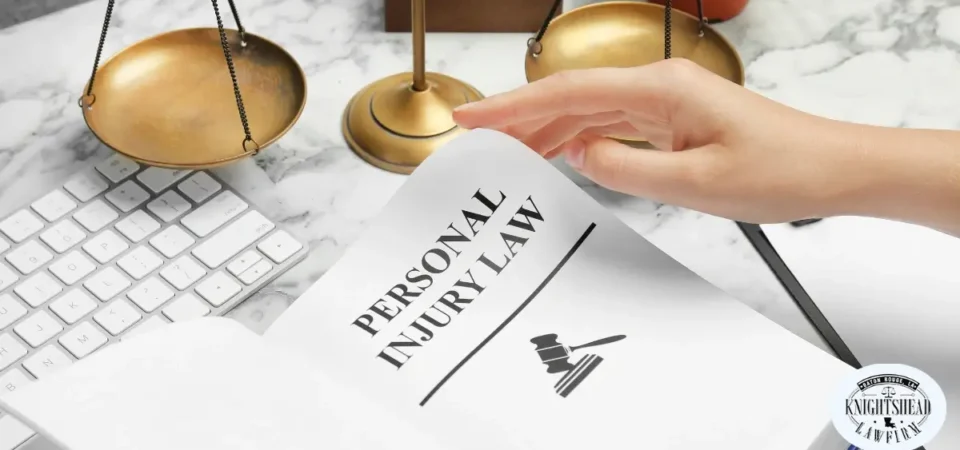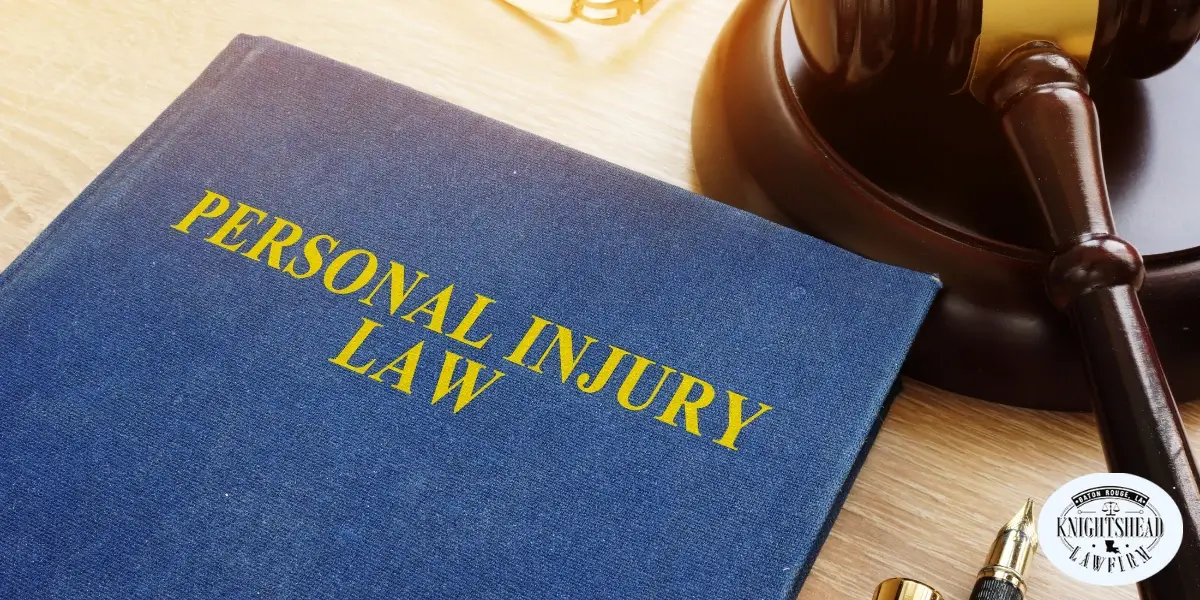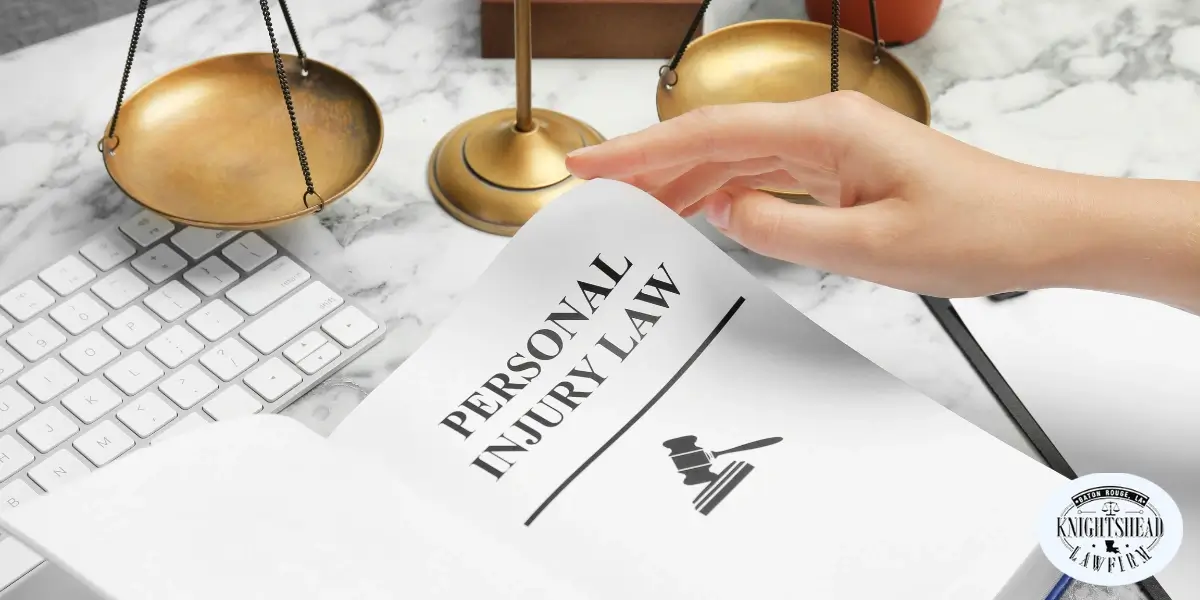|
|
Last
Modified on
Sep 15, 2025
Understanding the Louisiana personal injury statute of limitations is important if you’ve been injured in an accident. The law sets strict deadlines for when you can file a civil claim, and missing this deadline could mean permanently losing your right to recover compensation. Knowing how the law works and acting quickly can make all the difference when it comes to protecting your rights and pursuing the compensation you deserve.
About Us
For over 15 years, the Knightshead Law Firm has been a trusted ally for clients navigating complex legal matters in Louisiana. Our clients always come first, and we strive to offer not just experienced legal counsel but also empathetic support and guidance through every step of the process. With us, you’re never facing the legal system alone.

What Is a Statute of Limitations?
With 62 million Americans getting medical attention for preventable injuries in 2023, slip and falls taking the top spot at 35% of all preventable injuries, and the price tag of these injuries costing over $1.2 trillion, many wonder if they can still file a claim for that old accident.
However, the statute of limitations is essentially a legal time limit for filing a civil claim. In personal injury cases, it sets the window during which an injured person can bring a personal injury claim against the party responsible for their injuries. This is a critical deadline for victims of any incident, from a slip and fall to a car accident. If you miss this deadline, the court is likely to dismiss your case, regardless of the strength of your evidence or the clarity of your injuries.
Why the Statute of Limitations Matters
The statute of limitations isn’t just a legal deadline; it’s a tool that insurance companies use to either pressure you into settling or to use against you. They know exactly how long you have to file a personal injury claim, and they often claim that delays in filing mean you’re not seriously injured, your injury was caused by something else, or that your delay indicates a lack of credibility. This is a common tactic used in cases stemming from crashes on dangerous local roads, where the cause of the accident may be complex.
By acting quickly, you can protect yourself from these tactics. Filing within the proper timeframe shows the insurance company that you’re serious and prepared, and it gives your personal injury attorney the time they need to build a strong case.
The New Two-Year Timeframe
Recently, lawmakers extended the filing period for personal injury claims to two years. This update brings Louisiana closer in line with other states. However, this timeframe is still relatively short compared to the national average. Under the new law, injured victims generally have two years from the date of their injury to file a personal injury claim in court.
While two years might seem like plenty of time, it can pass faster than you expect. Between medical treatments, discussions with the insurance company, and financial pressures, some victims put off filing a claim or securing a lawyer until it’s too late. This is especially true when victims are focused on recovering from the common injuries sustained in these traumatic events.
Exceptions and Special Circumstances
There are situations where the timeline can change. Certain factors, like your age, the nature of the injury, or who caused it, can affect when the clock starts or how long you have. Some of these exceptions include:
- Discovery Rule. In rare cases, if you couldn’t have reasonably discovered your injury right away, the clock could start when you become aware of it.
- Minors. If the injured person is under the age of 18, the time limit might not begin until they reach adulthood.
- Government defendants. Claims against government entities often have much shorter notice requirements, sometimes just months.
- Wrongful death. The two-year deadline also applies, but the clock starts on the date of the death as opposed to the date the injury occurred.
Because these exceptions can be complicated and vary from case to case, it’s important to get professional guidance. An experienced personal injury attorney can evaluate your situation, identify any special circumstances, and make sure your claim is filed on time.
Hire a Personal Injury Lawyer
When your path to compensation is on the line, your only decision is to hire a personal injury lawyer. Many victims underestimate how quickly time passes or assume they can negotiate directly with insurance companies. Unfortunately, this approach often leads to lost opportunities and reduced compensation.
An experienced attorney knows how to move your case forward while keeping an eye on the deadline. They can also handle the complex paperwork and filings required by Louisiana courts, giving you peace of mind while you focus on recovery.

FAQs
Can Filing an Insurance Claim Pause the Statute of Limitations?
No, filing an insurance claim can’t pause the statute of limitations, as filing an insurance claim isn’t the same as filing a claim in court. While your insurer investigates and negotiates, the clock on the statute of limitations keeps ticking. Many people assume that active negotiations preserve their rights, but if the deadline passes without filing in court, you could lose the chance to recover. Always have a personal injury attorney confirm your deadline.
What Happens if New Injuries Appear After the Deadline?
If you discover additional injuries after the statute of limitations expires, it’s usually too late to include them in a claim. However, if the injuries weren’t reasonably discoverable before the deadline, you could qualify for an exception under the discovery rule. These cases are fact-specific and require strong evidence. Consulting an attorney immediately after noticing new symptoms is critical.
Can I Still Recover Damages if the Other Party Admits Fault After the Deadline?
No, you can’t recover damages if the other party admits fault after the deadline. Even if the at-fault party admits liability, the statute of limitations still applies. Courts strictly enforce these deadlines, and admissions of fault don’t extend them. The only way to preserve your rights is to file on time.
Does the Statute of Limitations Differ for Intentional Harm Versus Negligence?
Depending on the situation, the statute of limitations could differ for intentional harm versus negligence. For intentional acts like assault, courts could interpret the timeline differently. However, for most negligence-based injuries, the two-year deadline is the standard. Because these distinctions can be complicated, especially when criminal charges overlap with civil claims, a personal injury lawyer can clarify the specific rules for your case.
Act Before It’s Too Late
When it comes to personal injury cases, timing is everything. At the Knightshead Law Firm, our experienced personal injury attorneys can help make sure your personal injury claim is filed properly and on time, giving you the strongest chance of securing the compensation you deserve. Contact us today to schedule a free consultation.






